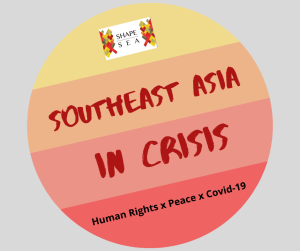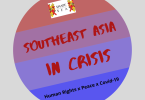Golda Benjamin and Kalayaan ConstantinoGolda Benjamin is the Senior Researcher and Representative for Southeast Asia of the Business and Human Rights Resource Centre. Kalayaan Constantino is Oxfam in Asia’s Policy and Campaigns Manager. Read the full report entitled “Women’s Human Rights and Business†here: https://bit.ly/womensBHR.
This report is produced as part of Oxfam’s regional program on Gender Transformative and Responsible Agribusiness Investments in Southeast Asia (GRAISEA). Significant inputs were provided by the Business & Human Rights Resource Centre, Institute for Social Entrepreneurship in Asia (ISEA), Initiatives for Dialogue and Empowerment through Alternative Legal Services (IDEALS Philippines), and Weaving Women’s Voices in Southeast Asia (WEAVE).
 The sweeping impact of COVID-19 on people’s lives and livelihoods continues to be devastating and unparalleled. As governments and businesses grapple with responses and recovery, another harsh reality stands out: the pandemic has revealed and increased the vulnerabilities faced by women at work. It has underlined the need for meaningful and lasting solutions.Across the region, women workers are underpaid and undervalued. They are much more likely to hold low-paying jobs. Even when in comparable roles, Asian women earn less on average – between 70 – 90 percent of what men earn. Over 70 percent of women workers in Asia Pacific are in informal employment (International Labor Organization, 2018).As informal workers, many women do not have access to benefits such as sick and maternity leave or social protection. This invisibility also results in their exclusion by both governments and businesses in emergency response actions where benefits often go to heads of families, typically the husbands or fathers, or to those enlisted formally in companies’ payrolls.At the same time, women traditionally assume most of the care work responsibilities for their families. With schools physically closed and shifting to online learning, more time has to be spent by women to look after their children and their education at home. When a family member gets sick, the challenges increase.There are reports of increased domestic violence against women and girls. Lack of access to much needed support due to movement restrictions and the pandemic overburdening police, healthcare, and legal safety nets has severely limited the protection and remedial options available to survivors.However, both governments and businesses can proactively step in to improve the safety, wellbeing, and the rights of women and girls during this pandemic and beyond. Their actions can be founded upon the United Nations Guiding Principles on Business and Human Rights (UNGPs) – endorsed as the world’s first corporate human rights responsibility initiative.On June 9 to 11, the United Nations will convene a Virtual Forum on Responsible Business and Human Rights in Asia and the Pacific to discuss the current challenges and apt responses. This forum is an opportune moment to consider the plight of people, especially women and girls, who are hardest hit by the pandemic. Governments and businesses must now step in to enact legal and policy frameworks to protect women at work, and they can start this by making commitments to protecting all rights of women and girls. Governments and businesses must ensure all workers and communities they work with are aware of and can claim their rights.Human rights due diligence policies must be gender-sensitive. Businesses must compensate women for their work fairly and prevent any form of discrimination or violence against them. In cases where any right is violated, remedies must be available to survivors where they can actively and meaningfully access such through a process that enables and empowers them. Governments must also provide service infrastructure to lessen unpaid care work responsibilities of women and girls, and promote positive social norms where care tasks are shared between women and men.These are mandatory steps to start addressing the inequalities in the workplace. Opportunity for women to lead the conversations, decisions, and processes that affect them is critical to correcting such structural problems. Women’s rights organizations can make meaningful contributions and drive response and recovery plans and actions; people and partners from diverse platforms must come together to integrate these reforms.Through a participatory and inclusive process led by women, their concerns and solutions can then be reflected in National Action Plans (NAP) on Business and Human Rights and other national instruments. These inputs can also contribute to the creation of programs to implement regional policy frameworks like the ASEAN Action Agenda on Mainstreaming Women’s Economic Empowerment and the ASEAN Guidelines on Responsible Investments in Food, Agriculture, and Forestry (Business & Human Rights Resource Centre et al. 2020).In the Philippines, the Commission of Human Rights has pushed for the development of a NAP since 2013. There have been other multi-sectoral efforts to promote inclusive business where the private sector uses their products, services, or even their supply chains to respect human rights, beat poverty, and create prosperity. However, government policies and formal commitments have yet to be made.To build a better future for all Asians, we must not only strive for better outcomes but also improve how we go about achieving them. As the world reflects on how to recover from the pandemic, governments and businesses must meaningfully include women and girls and empower them to reap full rights and benefits in their workplaces and beyond.References:Business & Human Rights Resource Centre, ISEA, WEAVE, IDEALS, and Oxfam. 2020. “Women’s Human Rights & Business: What ASEAN Governments and Businesses Can Do to Support Gender Equality and the Empowerment of Women in the Workplace.†https://www.business-humanrights.org/en/womens-human-rights-business-what-asean-governments-and-businesses-can-do-to-support-gender-equality-and-the-empowerment-of-women-in-the-workplaceInternational Labor Organization. 2018. “Women and men in the informal economy: a statistical picture†(third edition) / International Labour Office – Geneva. https://www.ilo.org/wcmsp5/groups/public/—dgreports/—dcomm/documents/publication/wcms_626831.pdf
The sweeping impact of COVID-19 on people’s lives and livelihoods continues to be devastating and unparalleled. As governments and businesses grapple with responses and recovery, another harsh reality stands out: the pandemic has revealed and increased the vulnerabilities faced by women at work. It has underlined the need for meaningful and lasting solutions.Across the region, women workers are underpaid and undervalued. They are much more likely to hold low-paying jobs. Even when in comparable roles, Asian women earn less on average – between 70 – 90 percent of what men earn. Over 70 percent of women workers in Asia Pacific are in informal employment (International Labor Organization, 2018).As informal workers, many women do not have access to benefits such as sick and maternity leave or social protection. This invisibility also results in their exclusion by both governments and businesses in emergency response actions where benefits often go to heads of families, typically the husbands or fathers, or to those enlisted formally in companies’ payrolls.At the same time, women traditionally assume most of the care work responsibilities for their families. With schools physically closed and shifting to online learning, more time has to be spent by women to look after their children and their education at home. When a family member gets sick, the challenges increase.There are reports of increased domestic violence against women and girls. Lack of access to much needed support due to movement restrictions and the pandemic overburdening police, healthcare, and legal safety nets has severely limited the protection and remedial options available to survivors.However, both governments and businesses can proactively step in to improve the safety, wellbeing, and the rights of women and girls during this pandemic and beyond. Their actions can be founded upon the United Nations Guiding Principles on Business and Human Rights (UNGPs) – endorsed as the world’s first corporate human rights responsibility initiative.On June 9 to 11, the United Nations will convene a Virtual Forum on Responsible Business and Human Rights in Asia and the Pacific to discuss the current challenges and apt responses. This forum is an opportune moment to consider the plight of people, especially women and girls, who are hardest hit by the pandemic. Governments and businesses must now step in to enact legal and policy frameworks to protect women at work, and they can start this by making commitments to protecting all rights of women and girls. Governments and businesses must ensure all workers and communities they work with are aware of and can claim their rights.Human rights due diligence policies must be gender-sensitive. Businesses must compensate women for their work fairly and prevent any form of discrimination or violence against them. In cases where any right is violated, remedies must be available to survivors where they can actively and meaningfully access such through a process that enables and empowers them. Governments must also provide service infrastructure to lessen unpaid care work responsibilities of women and girls, and promote positive social norms where care tasks are shared between women and men.These are mandatory steps to start addressing the inequalities in the workplace. Opportunity for women to lead the conversations, decisions, and processes that affect them is critical to correcting such structural problems. Women’s rights organizations can make meaningful contributions and drive response and recovery plans and actions; people and partners from diverse platforms must come together to integrate these reforms.Through a participatory and inclusive process led by women, their concerns and solutions can then be reflected in National Action Plans (NAP) on Business and Human Rights and other national instruments. These inputs can also contribute to the creation of programs to implement regional policy frameworks like the ASEAN Action Agenda on Mainstreaming Women’s Economic Empowerment and the ASEAN Guidelines on Responsible Investments in Food, Agriculture, and Forestry (Business & Human Rights Resource Centre et al. 2020).In the Philippines, the Commission of Human Rights has pushed for the development of a NAP since 2013. There have been other multi-sectoral efforts to promote inclusive business where the private sector uses their products, services, or even their supply chains to respect human rights, beat poverty, and create prosperity. However, government policies and formal commitments have yet to be made.To build a better future for all Asians, we must not only strive for better outcomes but also improve how we go about achieving them. As the world reflects on how to recover from the pandemic, governments and businesses must meaningfully include women and girls and empower them to reap full rights and benefits in their workplaces and beyond.References:Business & Human Rights Resource Centre, ISEA, WEAVE, IDEALS, and Oxfam. 2020. “Women’s Human Rights & Business: What ASEAN Governments and Businesses Can Do to Support Gender Equality and the Empowerment of Women in the Workplace.†https://www.business-humanrights.org/en/womens-human-rights-business-what-asean-governments-and-businesses-can-do-to-support-gender-equality-and-the-empowerment-of-women-in-the-workplaceInternational Labor Organization. 2018. “Women and men in the informal economy: a statistical picture†(third edition) / International Labour Office – Geneva. https://www.ilo.org/wcmsp5/groups/public/—dgreports/—dcomm/documents/publication/wcms_626831.pdf





